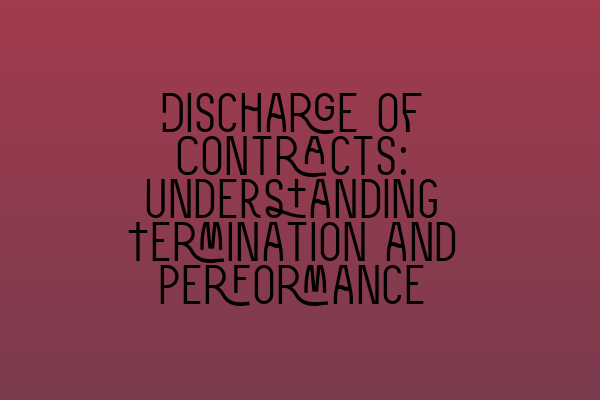Discharge of Contracts: Understanding Termination and Performance
In contract law, the concept of discharge refers to the termination of contractual obligations between parties. It is crucial for individuals involved in contract agreements to have a thorough understanding of various discharge methods to ensure that they fulfill their legal obligations and protect their rights.
In this article, we will delve into the intricacies of discharge of contracts and explore the different ways through which contracts can be terminated or performed. Whether you are a solicitor, a law student, or simply interested in contract law, this comprehensive guide will provide you with valuable insights.
1. Termination of Contracts
Termination of contracts occurs when the parties involved decide to end their contractual relationship. This can happen due to various reasons, including:
- Mutual Agreement: Parties may agree to terminate a contract if they believe it no longer serves their best interests.
- Breach of Contract: If one party fails to fulfill their contractual obligations, the other party may choose to terminate the contract.
- Impossibility of Performance: If performance becomes impossible due to unforeseen circumstances, such as natural disasters or government regulations, the contract may be terminated.
- Frustration of Purpose: When the original purpose of the contract becomes impossible to achieve, the contract may be terminated.
It is essential for both parties to follow the proper legal procedures when terminating a contract. Seeking legal advice from a solicitor can help ensure that the termination is conducted in accordance with the law.
2. Performance of Contracts
While termination of contracts focuses on ending the contractual relationship, performance of contracts revolves around fulfilling contractual obligations. Contracts can be discharged by performance in the following ways:
- Complete Performance: When both parties fulfill all their obligations as outlined in the contract, it is considered complete performance.
- Substantial Performance: If the party performing the contract meets most of their obligations, but with minor deviations, it is considered substantial performance.
- Performance of Conditions: Some contracts include specific conditions that must be met for performance. Once these conditions are fulfilled, the contract is discharged.
It is important to remember that performance must occur within the specified time frame and adhere to the contractual requirements to avoid any potential legal disputes.
3. Rights and Remedies upon Discharge
Upon the discharge of a contract, the parties involved may have certain rights and remedies at their disposal. These can include:
- Damages: In the case of a contract breach, the aggrieved party may be entitled to monetary compensation.
- Specific Performance: If monetary compensation is not sufficient, the court may order the breaching party to fulfill their obligations as originally agreed.
- Rescission: In certain circumstances, the court may rescind the contract, effectively undoing its legal effects.
Seeking legal guidance is crucial when considering the appropriate rights and remedies to pursue. A solicitor can assess your specific situation and guide you on the best course of action.
Conclusion
Discharge of contracts encompasses the termination and performance of contractual obligations. Understanding the various methods of discharge, including termination and performance, is crucial for individuals involved in contract agreements.
If you require assistance with contract law matters, it is recommended to consult with a qualified solicitor. They can provide you with expert advice tailored to your specific situation and help ensure that your rights are protected.
To learn more about the legal profession and related topics, check out our other articles:
- Mentorship for Aspiring Solicitors: Nurturing Talent in the Legal Field
- Legal Challenges and Pitfalls: Navigating the Complexities of the Legal System
- Demystifying the Solicitors Qualifying Examination (SQE): What You Need to Know
- Embracing Diversity: Advancing Inclusivity in the Legal Profession
- Recognizing Excellence: Law Industry Awards and Accolades
Should you require any further information or legal assistance, do not hesitate to contact us. Our team of expert solicitors is here to help.
